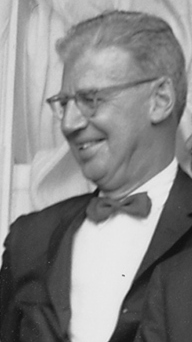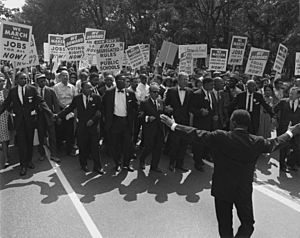Joseph L. Rauh Jr. facts for kids
Quick facts for kids
Joseph L. Rauh Jr.
|
|
|---|---|

Rauh, 1963
|
|
| Born | January 3, 1911 Cincinnati, Ohio, U.S.
|
| Died | September 3, 1992 (aged 81) |
| Alma mater | Harvard University Harvard Law School |
| Spouse(s) | Olie Westheimer (1935–his death) |
| Children | B. Michael Rauh, Carl S. Rauh |
Joseph Louis Rauh Jr. (born January 3, 1911 – died September 3, 1992) was a very important American lawyer. He was known for fighting for civil rights and civil liberties. This means he worked to make sure everyone had fair treatment and basic freedoms. After he passed away, he received the Presidential Medal of Freedom. This is the highest award a civilian can get in the United States. President Bill Clinton gave him this honor in 1993.
Contents
Early Life and Education
Joseph Rauh Jr. was born in Cincinnati, Ohio. His family was Jewish. His father made shirts, and his mother was born in the U.S. Joseph decided not to join the family business.
He chose to go to Harvard University, just like his older brother. His older sister became a doctor. At Harvard, Joseph played center on the school's basketball team. He studied economics and graduated with high honors in 1932.
After college, he continued his studies at Harvard Law School. He was an excellent student and finished at the top of his class.
Career Highlights
After law school, Rauh worked with important people. He helped write laws for President Franklin D. Roosevelt's "New Deal" programs. These programs aimed to help the country during the Great Depression.
He also worked for two Supreme Court Justices, Benjamin N. Cardozo and Felix Frankfurter. Justice Frankfurter had been his teacher at Harvard Law.
World War II Service
When World War II began, Rauh wanted to help. He joined the United States Army Air Corps in 1942. He became a lieutenant. He was sent to Australia to work as an administration expert.
He served in civil affairs in the South Pacific. This meant he helped manage civilian life in areas affected by the war. He reached the rank of lieutenant colonel.
Fighting for Civil Liberties
After the war, Rauh returned to Washington, D.C. He started his own law practice. He focused on protecting civil liberties. This meant he worked to defend people's basic rights and freedoms.
He also worked as a lawyer for Walter Reuther, a famous labor leader. Rauh helped the United Auto Workers union with their civil liberties policies.
Championing Civil Rights
Rauh is most famous for his work in the civil rights movement. He fought for equal rights for all people.
Founding Americans for Democratic Action
In 1947, he helped start a group called Americans for Democratic Action. Other important members included Eleanor Roosevelt and Hubert Humphrey. This group worked to promote liberal ideas and civil rights.
Key Role in Civil Rights Laws
In 1948, Rauh was a delegate at the Democratic National Convention. He played a big part in writing the civil rights section of the party's platform. This section became the basis for many important human rights laws passed later.
He also worked hard to get civil rights bills passed in Congress. He helped with the Civil Rights Act of 1964. This law outlawed discrimination based on race, color, religion, sex, or national origin. He also helped with the Voting Rights Act of 1965. This law protected the right to vote for all citizens. He also contributed to the Civil Rights Act of 1968.

Rauh also stood up against McCarthyism. This was a time when people were unfairly accused of being communists. He was also a long-time member of the National Association for the Advancement of Colored People (NAACP). This group works for the rights of African Americans.
Personal Life
Joseph Rauh Jr. passed away in 1992. He had been married to Olie Westheimer for 57 years. They had two sons, B. Michael Rauh and Carl S. Rauh. He also had three grandchildren.
His son, Carl S. Rauh, became a lawyer. He served as the U.S. Attorney for the District of Columbia. His other son, B. Michael Rauh, also became a lawyer. He helps lead an organization that hosts annual lectures in his father's honor.
Awards and Recognition
- In 1993, he was given the Presidential Medal of Freedom by President Bill Clinton. This was a posthumous award, meaning it was given after his death.
- In 1983, he received the Franklin D. Roosevelt Four Freedoms Award for freedom of speech.
See also
- List of law clerks of the Supreme Court of the United States (Seat 2)
 | Victor J. Glover |
 | Yvonne Cagle |
 | Jeanette Epps |
 | Bernard A. Harris Jr. |

